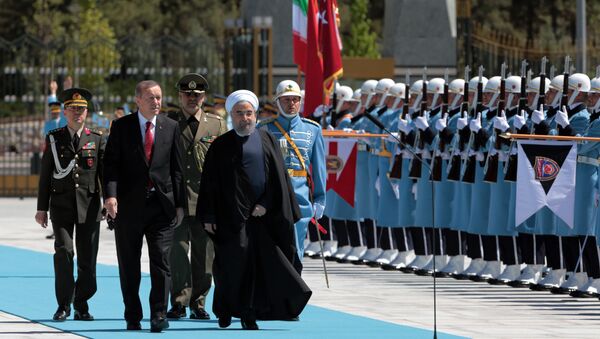In the aftermath of Iraqi Kurdistan's independence referendum — which saw over 90% of votes cast in favor of independence — Iran, Turkey and Iraq united to isolate the autonomous Kurdish region, and, ultimately, rendered an independent Kurdish state in northern Iraq unfeasible.
More recently, during the wave of anti-government protests in Iran, Turkey's President, Recep Tayyip Erdogan, expressed support for the Iranian leadership.
Erdogan's rare show of support for Iran caught many by surprise, as Turkish proxy militants are currently battling the Syrian Army and a string of Iran-backed forces in Syria's northwestern province of Idlib.
READ MORE: Iraqi Kurdistan's Government Wants Russia to Help Solve Independence Crisis
However, when the potential regional implications of an escalation in Iran are considered, Erdogan's stance becomes understandable and unsurprising.
President Erdogan and his government are perhaps already dreading the prospect of refugees crossing the Turkey-Iran border to escape violence or political instability in Iran, as Turkey is already burdened with in excess of 2 million Syrian refugees, and has been receiving insufficient external support to limit the economic fallout caused by the refugee crisis.
Furthermore, Iran's population is almost four times greater than Syria's pre-war population, so the exodus of Iranians into neighboring countries would inevitably be huge, and potentially unparalleled by any recent regional crisis. The economic costs of such a crisis are likely to cost Erdogan and his AKP party support amongst Turkey's electorate.
Perhaps more importantly, political instability in Iran could see Kurdish separatists from the PJAK militant group gain influence and territory in Iran, near Turkey's bordering, in a similar fashion to how their Syrian counterparts capitalized on the power vacuum to seize control of large swathes of northern and north-eastern Syria, including around 80% of the country's proven oil reserves.
The presence of Kurdish-led forces near Turkey's southern border has concerned Erdogan, and he recently announced that a military operation would imminently be launched against Kurdish militants in Syria.
READ MORE: Turkey May Expand Syrian Operation to Manbij, East of Euphrates Amid YPG Worries
Although relations between Iran and Turkey aren't entirely amicable, it's clear that Turkey is directly exposed to any adverse developments in Iran, and is therefore keen for the status quo to hold.
For the time being, cooperation between Iran and Turkey is strictly limited to a few matters where they both have shared vested interests, or need to tackle a common threat. There certainly is scope for Turkey-Iran relations to strengthen, especially once the dust settles from the conflict in Syria, as they'll no longer be actively backing warring parties.
Turkey will also need to initiate and maintain a level of cooperation with President Bashar al-Assad's government — considered to be Iran's closest regional ally — to catalyze the safe return of refugees in Turkey to Syria, and bolster bilateral post-war trade. This cooperation could further align Turkey with Iran.
The views and opinions expressed by Suliman Mulhem are those of the author and do not necessarily reflect those of Sputnik.
Follow Suliman Mulhem on Twitter.


